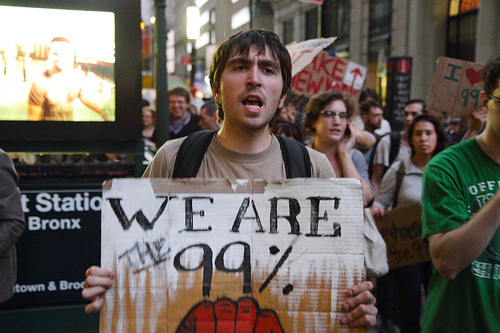By Paul Esau (The Cascade) – Email
Date Posted: October 13, 2011
Print Edition: October 12, 2011
I’m sure you’ve all heard of Occupy Wall Street by now, whether on the news, online or through Facebook babble. You’ve probably also formed your own opinions about its potential influence, credibility and motivation. I’m not going to try to change those opinions, only highlight a couple issues that I find a little troubling about the movement.
1. Voices outside and within the Occupy Wall Street movement have been categorizing it as the American version of the “Arab Spring.” This is balderdash. The Arab Spring was characterized by a series of political revolutions whereas Occupy Wall Street is, at best, a protest. Both can be considered mass movements, yet the political aims and scope are entirely dissimilar. The Wallstreeters aren’t trying to overthrow the present political system, they are instead attempting to “engage in dialogue” with the system and its villainous overlords (the filthy rich).
2. “We are the 99 per cent,” is the rallying call echoing across New York’s Zucotti Park where the protest is based, yet no initiative has been taken to translate this new-found identity into positive action. A document entitled “Principles of Solidarity-working draft” can be found on the website of Occupy Wall Street’s General Assembly, yet it is little more than a self-congratulating summary of the origins of the movement. A stated principle to “engage in direct and transparent participatory democracy” is wonderful rhetoric, but it’s also a principle that the U.S. has been constitutionally-bound to embody for more than 200 years. Consequently, it’s hardly new material, and a difficult principle to practically pursue while chanting proverbs in a public park.
3. A small, but important grievance that I have with the protests (most especially the recent Occupy Boston offshoot) is their pervasive and continuing claims that they have been brutalized by police officers. This is not to imply that police officers haven’t occasionally violated their responsibilities in respect to supervising and controlling the demonstrations, only that these supposed violations need to be evaluated in the correct perspective. The line between peaceful protest and violent demonstration is often fluid, and from the shaky videos I’ve seen of alleged instances of brutality, difficult to ascertain. A mob of advancing, shouting protestors engaging in civil disobedience presents an extremely delicate situation for any police officer, whose mandate, it must be remembered, does allow them to arrest people who “breach the peace.” I’m tired of watching videos (on the Occupy Wall Street website) of officers arresting protestors in alleged acts of “brutality,” as if the mere experience of being cuffed was a violation of their (the protestor’s) personal sanctity.
4. It seems to me that the main motivation behind much of Occupy Wall Street is disgust with the rich.“Why should 1 per cent have so much?” is the resounding question, “when we have so (comparably) little?” The righteous indignation of this stance is mildly ironic when the same question is applied on the global scale, leaving many of the protesters in the (comparably) affluent (and therefore guilty) camp. Perspective can be a harsh mistress.
Yet, despite everything, I feel cautiously optimistic about Occupy Wall Street and its affiliates across the country. Such voices need to be heard, even if they have yet to ascertain the most effective avenue for expression. I admit that I won’t be attending Occupy Vancouver, yet I feel that the movement has tapped a popular source of discontent that should be heeded by those we’ve elected.


